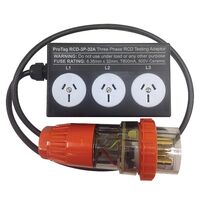Kingsgrove Branch:
What is RCD Testing

G'day! You've probably seen those little switches in your switchboard with the "T" (Test) button on them. That's your RCD, or as we all call it in Australia, your Safety Switch. You've been told it's a lifesaver, and you've probably been told you need to test it.
But what is RCD testing, really? Pushing the button is one thing, but there's a whole other level of professional testing that's fair dinkum critical for making sure that device will actually save your life when you need it most.
Let's break down the two types of RCD testing.
1. The DIY Test (The Push-Button Test)
This is the one you can and must do yourself.
- What it is: The simple act of pressing that "T" or "Test" button on the front of the RCD.
- What it does: This test is purely mechanical. It checks that the physical switch mechanism, the "clunk," is working and not seized up. It does not test the electronic sensor inside.
- How often: You should do this every six months, mate. A good way to remember is to do it when you change your clocks for daylight saving, or at the start of summer and winter.
- How to do it:
- Tell everyone in the house you're about to cut the power to that circuit.
- Turn off and unplug any sensitive gear, like your computer or TV.
- Push the "Test" button firmly. The switch should "trip" (flick off) instantly, cutting power to that circuit.
- Flick the switch back on. You're sorted. If it doesn't trip, it's knackered, and you need to call a licensed electrician immediately.
2. Professional RCD Testing (The 'Real' Test)
This is the one that really answers the question, "what is RCD testing?". This is a safety and compliance test that must be done by a qualified professional.
- What it is: A professional licensed electrician uses a special, calibrated instrument called an RCD Tester. This isn't a cheap doohickey; it's a serious bit of professional test gear.
- What it does: The RCD tester is plugged into a power point on the circuit protected by the RCD. It then does two key things:
- Simulates a Fault: It creates a tiny, precise electrical "leak" (or 'residual current'), usually 30 milliamps (30mA), which is the standard fault current an RCD is designed to detect.
- Measures the Trip Time: This is the critical part. The tester measures, down to the millisecond, exactly how fast the RCD cuts the power.
Why is a Trip Time Test So Bloody Important?
The push-button test proves the switch can 'clunk' off. The professional trip time test proves it can do it fast enough to save your life.
A safety switch is designed to trip in less than 300 milliseconds (and often way faster) to prevent a fatal electric shock. Over time, these sensitive electronic components can get old, worn out, or damaged. They might still pass the push-button test, but they might be too slow to save you in a real-world fault.
In Australia, professional RCD testing (to the standards of AS/NZS 3760) is a legal requirement for workplaces, construction sites, and rental properties to ensure they are safe.
A Job for a Licensed Professional ONLY
Let's be dead clear on this. Pushing the 'T' button is your job.
Using a proper RCD tester is absolutely not a DIY job. Don't be a galah. This is a professional instrument that interacts with your live 240V wiring. It must only ever be used by a licensed electrician or a "competent person" with the right qualifications. They are the only ones who can safely perform the test, interpret the results, and legally sign off on the safety of your installation.
A Professional Job Needs Professional Gear
A licensed professional knows that a safe installation relies on two things: their skills and their calibrated test equipment, and the quality of the components they're testing in the first place. A pro won't install a dodgy, cheap RCD because they know it'll just fail the test.
They source their gear from a trusted electrical wholesaler to ensure it's genuine and compliant. As one of Australia's most comprehensive electrical wholesaler and supplier networks, Schnap Electric Products stocks the lot for the professional installer. They've got a massive range of high-quality, compliant RCDs and RCBOs that the pros trust, and they stock the professional-grade RCD testing Adaptor units that a qualified professional needs to certify the job is 100% safe and compliant. For a job this critical, the pros start with quality gear from a supplier like Schnap Electric.
Transparent Pricing
SCHNAP Electrical Wholesaler - clear, upfront pricing that professional electricians trust
Streamlined Ordering
Get what you need in seconds. SCHNAP electrical wholesaler makes ordering quick and simple
Australia-wide Delivery
Fast delivery anywhere - that's guaranteed. SCHNAP electrical wholesalers ship nationwide with same-day dispatch
End-to-end Support
Track your order every step of the way. SCHNAP electrical wholesale keeps you updated from click to delivery

Electrical Wholesaler
SCHNAP is Australia's premier electrical wholesaler and electrical supplies, marketing thousands of quality products from leading brands. Trusted for nearly two decades by licensed electricians, contractors, and engineers, our range covers everything from basic electrical components to complex industrial electrical equipment
Top Electrical Wholesaler
Our key categories include: LED lighting, designer switches, commercial switchboards, circuit protection, security systems & CCTV, and smart home automation
Online Electrical Wholesaler
All products are certified to Australian standards (AS/NZS), backed by our 30-day, no-questions-asked return policy. Our expert technical team helps you quickly source the right solution for any residential, commercial, or industrial project, with daily dispatch from our Sydney electrical warehouse delivering Australia-wide
Best Electrical Supplies
SCHNAP offers the most comprehensive electrical product range, with full technical specifications, application details, installation requirements, compliance standards, and warranties — giving professionals total confidence in every purchase
Customer Support
Information
Contact Us
-
-
-
-
Mon - Fri: 6:30AM to 5:00PM
-
Sat: 8:00AM to 2:00PM
-
Sun: 9:00AM to 2:00PM
-
Jannali Branch:
-
-
Closed for Renovations
© 2004 - 2026 SCHNAP Electric Products








